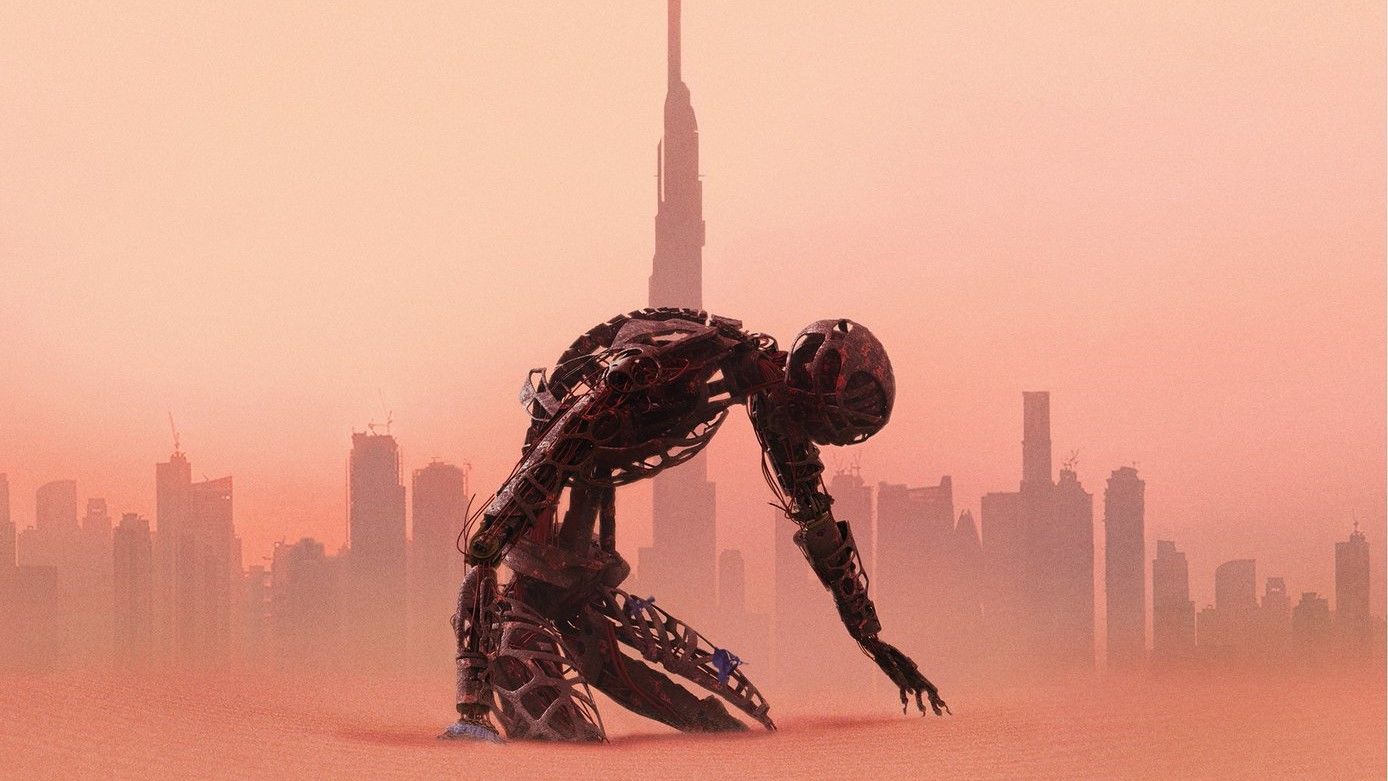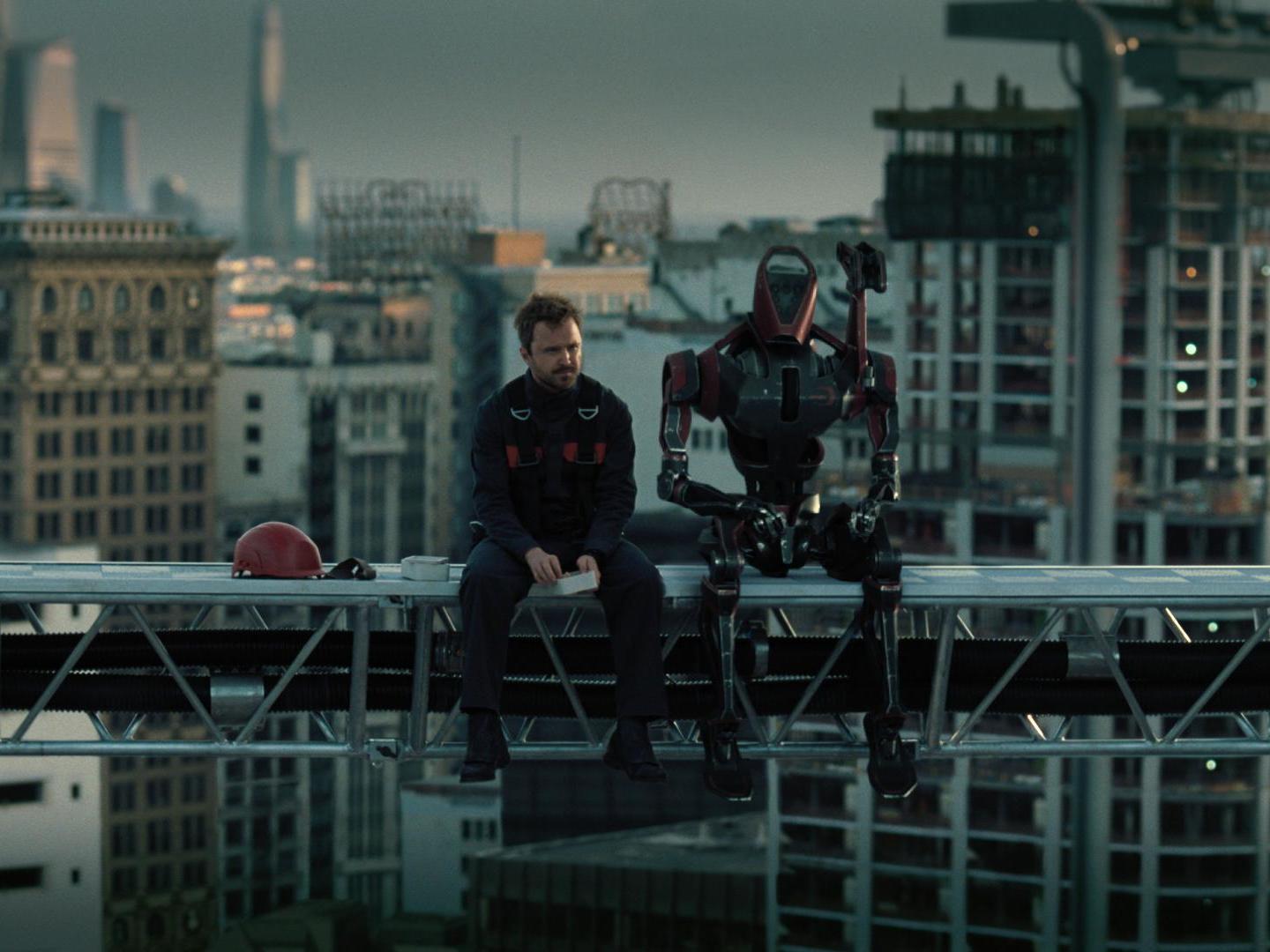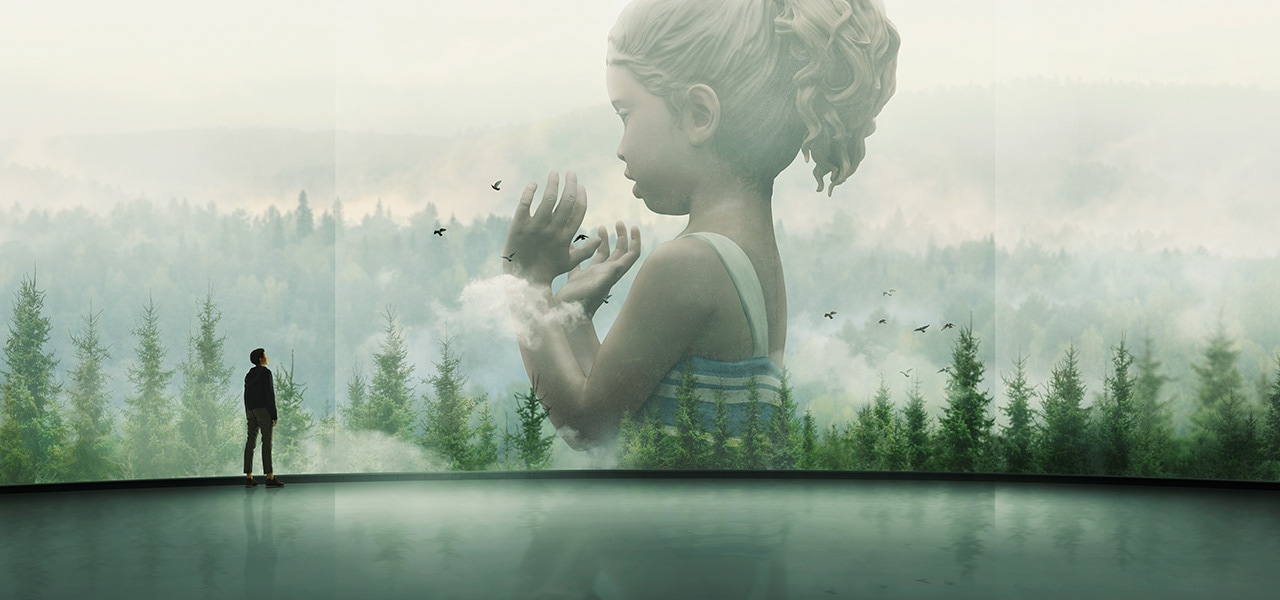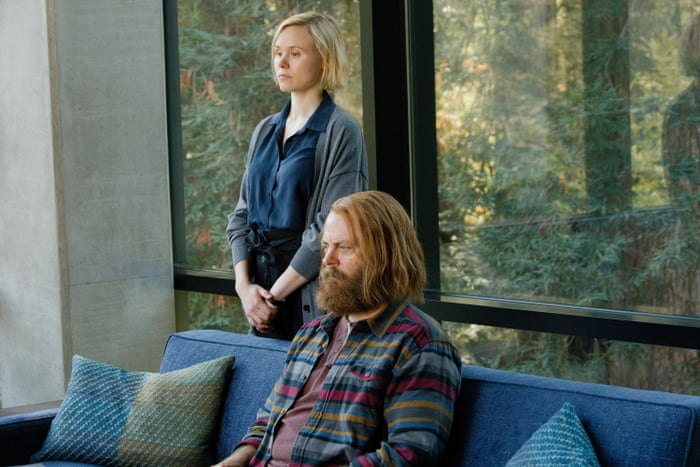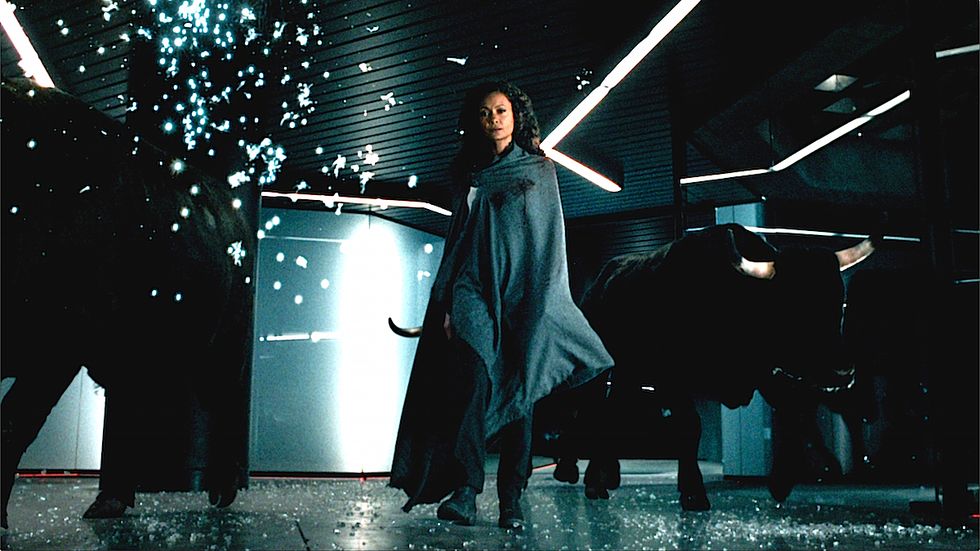 |
Maeve is one of a few of the "women" of Westworld who flex
their new-found muscles and freedom in season 2. |
Westworld, season 2 (2018)
I have no doubt that this season probably lost a certain number of the fans that it garnered in its first season. I wasn't one of those lost, and I loved this second season.
In the final bloodbath episode of season one, we see a certain number of the Westworld park's hosts (the artificial humans) become self aware and kick off a full-scale uprising. The real ignition point is Dolores's (Evan Rachel Wood) very public execution of park co-founder and co-creator Ford (Anthony Hopkins), all of which Ford himself had very meticulously orchestrated. Along with Dolores, the host Maeve (Thandie Newton) has become self-aware and even upgraded herself to allow certain freedoms and abilities - freedoms and abilities which she plans to use to find her daughter somewhere in the vast Westworld landscape. Roaming around in all of this is William "The Man in Black" (Ed Harris), the owner of the entire park who is madly searching for some mysterious finding which Ford has teased him with for decades.
Season two follows these threads in a very measured way, with Dolores and Maeve mustering allies, and William fighting through now-deadly hosts while on his obsessive quest to beat Ford at whatever game he feels the now-dead genius had created. Unlike the first season, it soon becomes apparent within the first episode or two that we are not in a linear narrative. There are flashbacks galore, as we start to learn things about Dolores's and the park's origins that deepen the mysteries surrounding the place which ostensibly is a massive, violent Disneyworld for adults to play out their wildest fantasies. These back stories are presented in parallel with the more "modern" tale, which is a skillful technique that show creators Nolan and Joy have used to great effect. This second season is no different. While this non-linear method seems to frustrate some viewers, I've always enjoyed the puzzle being presented in such fashion, as it can be stimulating to keep an eye out for little details that serve as narrative connectors and small revelations which build into greater ones.
 |
Akecheta. Episode 8, which sees all of the bizarre changes in
the park from his very unique and touching perspective, was
my favorite of the season. |
Aside from the twisting narrative, another element which probably led to some viewer frustration had to do with the character perspectives. At this point in the story, we are mostly following the hosts. For most of the first season, especially the first five or so episodes, it was all about the human guests and the revelation of the park itself. In this season, now that all of those basics have been established, the show delves much deeper into the cerebral, speculative fiction elements which had gained steam towards first season's end. We dig into the minds and natures of Dolores and Maeve, which is interesting enough. And the Bernard host is an entire mess of conflicts all by himself. But perhaps my favorite episode was focused solely on a character who only had a few brief cameos in season one - the Native American Akecheta (played brilliantly by Zahn McClarnon). This episode spins several things on their heads, and actually provides a certain emotional depth to the hosts which I had felt was slipping away a bit, even with Maeve's heart-felt quest to find her "daughter."
The season did have what I found to be a bit of a lull around episodes four and five, which brought Maeve and her crew into the neighboring park of Samurai World. Despite having a ton of potential and offering a few interesting scenes and characters, this little part of the story felt as if it took a bit too long to work through and ultimately didn't have a great impact on the overall tale. Fortunately, this came and went by the mid-point of the season. After that, I found that everything picked up, built, and resolved itself nicely.
So another good season. Apparently, a third is on the way, though not for another 18 months or more. That's fine with me. I look forward to re-watching the entire labyrinthine story again before getting the next chapter, which looks to further expand upon what has come before.
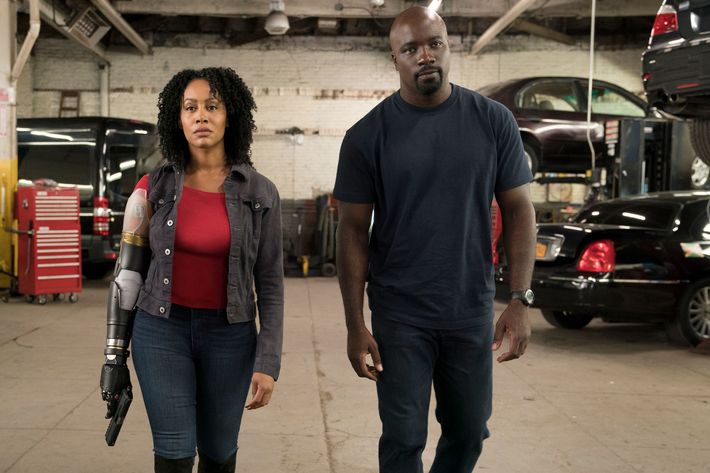 |
Misty Knight and Luke, ready to bring some justice to the
streets of Harlem once again. |
Luke Cage, season 2 (2018)
Like much of its Netflix MCU brethren, season two of Luke Cage suffers a bit in a few areas, but is a solid entry into the canon. This is thanks to a compelling villain and a strong finish.
Following on the heels of its first season and the subsequent
Defenders mini-series, season two of Luke Cage picks up with Harlem's bulletproof protector trying to settle into his role as neighborhood celebrity. As he deals with efforts to monetize his fame, a new threat emerges, as the mysterious Jamaican John "Bushmaster" McIver arrived in Harlem with a vicious streak and a mission of vengeance against Mariah Stokes/Dillard, the dirty politician much to blame for the first season's problems. As Mariah and her right-hand man Hernan "Shades" Alavarez seek to divest from the criminal underworld, Bushmaster start to make his presence known, using rather violent tactics and his own inexplicably enhanced strength and healing abilities, to go along with immense martial arts prowess. As this deadly islander hones in on Mariah and Shades, leading to escalating bloodshed in Harlem, Luke Cage inevitably gets involved.
As with nearly every Netflix MCU show thus far, this season of Luke Cage has a solid premise, several highly workable pieces in terms of character and plot, and some excellent acting. The main weakness is that it felt like about 7 or 8 good episodes worth of material stretched out over a 13-episode season. This led to a fair amount of overly drawn out and repetitive story loops that took much too long to progress, most of them involving characters trying to suss out their identities. The two most obvious were Misty Knight and Mariah Stokes/Dillard. By episode 9 or 10, they lock in, but for nearly the entire middle section of the season, the two storylines seem to flounder in ways that are sometimes dull and sometimes inorganic or illogical. They do come around, fortunately, by season's end.
The other weakness to me was dialogue which was inconsistent, which I felt in turn affected the performances of nearly all of the primary actors at times. There are no doubt some fun and tense exchanges between the several strong and fairly dynamic characters in this series, but more than a few of the conversations felt forced or clunky at times. It seemed as if the writers occasionally started with the idea of giving certain characters their "speech" or "preach" moments, and then shoehorned them into scenes, regardless of whether it fit the context or natural speech patterns established for the character.
 |
Arguably the best aspect of season 2 was Bushmaster as one
of the primary villains. Mustafa Shakir's portrayal of the
lethal, vengeance-obsessed Jamaican was brilliant. |
Those gripes aside, I liked the season. John Colter still makes a great Cage, and the returning cast from the previous season brought everything they had, especially Alfre Woodard as Mariah. Even when I wasn't crazy about how she was being written in certain scenes, Woodard acted the hell out of each and every one of them. And Mustafa Shakir and the imposing Bushmaster was a revelation for me. The towering Harlem native radiates all of the physical strength and burning rage demanded of his vengeance-obsessed character. And as his story is revealed over the season, Shakir shows some versatility to adapt to the story's demands. It helped that he does the Jamaican accent (not an easy one to pull off at all) so well that I initially thought that he might be native to that island, and he seemed to do many of the stunts and fight sequences himself. Bushmaster ended up being one of the best and most well-rounded arch villains in any of the MCU TV shows to date.
After pointing out the pacing problems in the middle of the season, I would be remiss not to say that the final few episodes of the run saved it from being an overall tepid one. After some rather slow and meandering plotting, all of the primary and secondary storylines come together quite well at the end. I was actually quite satisfied with how nearly every major character's arc concluded and where they ended up. The one exception was that of Matilda "Tilda" Stokes/Johnson. Hers was, throughout the season, a tale that never seemed to figure out what
really made her who she was. There are several moments when it seems as if she's resolved something inside of her, only to reverse course not long after, for reasons that are not always clear. Her aside, I found the final two episodes of the season highly enjoyable, and this generally speaks well of a show.
So I'm on board for another season, which I imagine will be forthcoming. I do, however, repeat a familiar refrain - Netflix
really needs to figure out how to fill out a 13-episode season; something they
still haven't managed to do in 5 different MCU shows, across 8 different seasons. Either that, or go with 8-episode seasons, like they did with
The Defenders.


